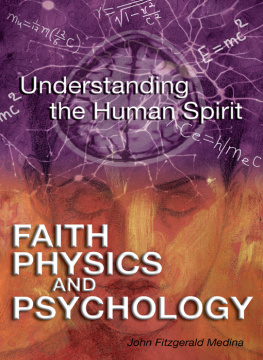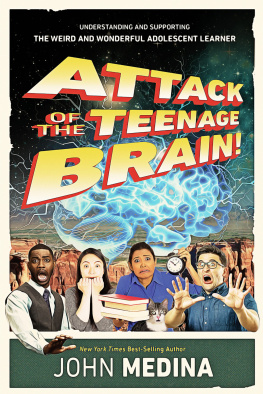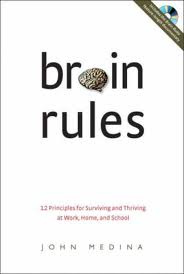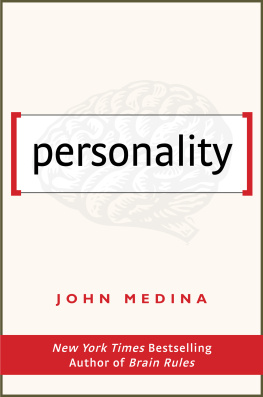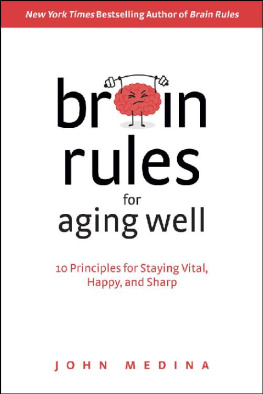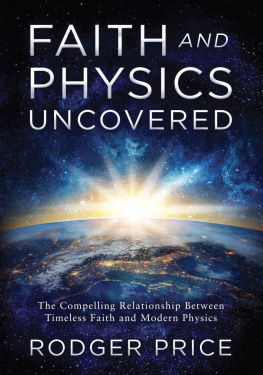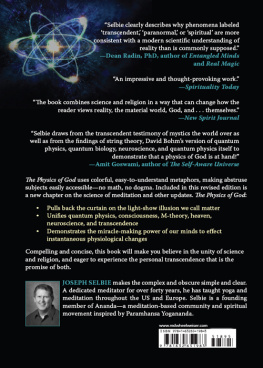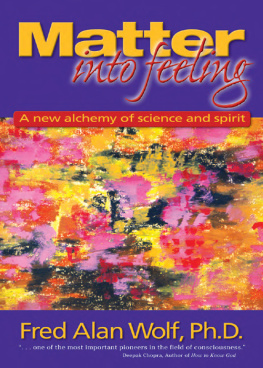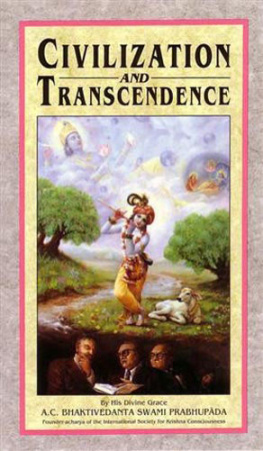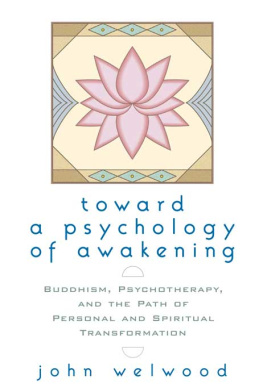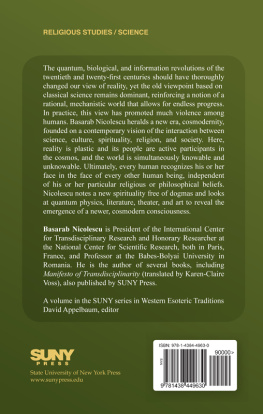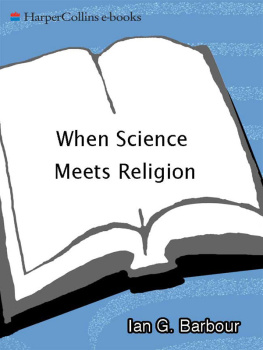
FAITH
PHYSICS
AND
PSYCHOLOHGY
FAITH
PHYSICS
AND
PSYCHOLOHGY
Rethinking Society
and the Human Spirit
John Fitzgerald Medina

Bah Publishing
415 Linden Avenue, Wilmette, Illinois 60091-2844
Copyright 2006 by the National Spiritual Assembly of the Bahs of the United States
All rights reserved. Published 2006
Printed in the United States of America on acid-free paper
09 08 07 06 4 3 2 1
Library of Congress Cataloging-in-Publication Data
Medina, John Fitzgerald.
Faith, physics, and psychology : rethinking society and the human spirit / by John Fitzgerald Medina,
p. cm.
Includes bibliographical references and index.
ISBN-13: 978-1-931847-30-8 (alk. paper)
ISBN-10: 1-931847-30-4 (alk. paper)
ISBN: 978-1-931847-96-4 (ebook)
1. Bahai Faith and social problems. I. Title.
BP370.M43 2006
297.9317dc22
2006043021
Cover design by Tracy Heckel of Guten Tag! www.gutentag.us
Book design by Suni Hannan
For the Blessed Beauty:
Great is the Day, and mighty the Call!
For my beloved mother and father,
and for my brothers and sisters
And for my wife and the love of my life, Nancy,
our beloved son, Joaquin,
and our precious daughter in
the Abh Kingdom, Corinne
1/A Civilization in Crisis
For at least the past two hundred years, the champions of Western culture have consistently held out the promise that the rapid spread of civilization (typically meaning Western civilization) would resolve humanitys problems in a straightforward manner through scientific, technologic, and economic breakthroughs. Such optimistic claims, however, are now incongruous with the rising tide of physical, psychological, and spiritual suffering that is occurring throughout the world. We live in perilous times: we are facing an overall failing paradigm. Many, if not all, of the following problems are now occurring in the United States, Europe, and in many other countries throughout the world: environmental degradation, increasing violence and terrorism, widening extremes of wealth and poverty, racial and ethnic animosity, malnutrition and hunger, gender inequality, rising mental health problems, escalating addictions, skyrocketing medical care costs, massive government budget deficits, ballooning consumer debt and bankruptcies, unemployment and underemployment, disintegrating families, alienated youth, abandoned elders, moral and ethical degeneration, political and business corruption, energy depletion, and socioeconomic injustice of all kinds.
In the past century, corporate advertisers have painted a picture of the good life that is based on the acquisition of material wealth and possessions. The functioning of the U.S. economy is based on the multiplication and instant gratification of wants and desires as evidenced by government officials who tell Americans to go out and spend in order to help the economy. Sadly, in spite of material prosperity, the good life, with its promise of happiness and fulfillment, has eluded many Americans. Commenting on the current state of affairs, a textbook titled Abnormal Psychology and Modern Life says,
On every side we see anxious, unhappy people who miss the realization of their potential because they cannot find adequate solutions or answers to problems that seem beyond them. The hassles of modern life are reflected in the massive amounts of tranquilizing chemicalsalcohol or otherwise, prescription and nonprescriptionwe as a society consume. Mental impairments of one sort or another now afflict more people than all physical health problems combined. Prospects for an increasing rate of adaptational failure, particularly in the psychological domain, seem compelling as we move toward the twenty-first century. How shall we cope?
Similarly, in The Progress Paradox: How Life Gets Better While People Feel Worse, author Gregg Easterbrook cites studies suggesting that most Americans and Europeans do not feel any happier today than they did fifty years ago, even though the vast majority of these Western peoples are presently enjoying many more material comforts than ever before. Easterbrook states that in the United States and the European Union, The incidence of clinical melancholy is rising in eerie synchronization with rising prosperity: Adjusting for population growth, unipolar depression is today 10 times as prevalent as it was half a century ago.
During the past five hundred years, the globe has seen the rise to world power of Western civilization due to the Scientific Revolution, the Industrial Revolution, the Age of Enlightenment, colonialism, capitalism, and socialismall of which emanated from Europe and the United States. Unlike any other culture in the world, Western civilization has had the military, economic, and technological power to assert itself and to spread all over the globe. Furthermore, there are a host of relatively recent developments that have also contributed considerably to the rapid dissemination of various Western ideas and practices: the rise of Western-dominated globalized capitalism, the ascendancy of powerful Western-based multinational corporations, the ease of global transportation, the advent of instantaneous global communication, the popularity of U.S. mass culture (such as rock music and Hollywood movies) in foreign nations, Western-style economic development schemes in the Third World, Western military and humanitarian aid, foreign elites educated in the West, immigration into Western nations and the resulting flow of ideas and values from Western family members to non-Western family members. Due to both historical and recent forces, Western culture now serves as a powerful, influential, and appealing subculture within many cultures throughout the world, including some that claim to be non-Western. The rapid dissemination of Western ideas and practices has inspired some people to attempt to build a world order based on Western economic development models and on the Western secular worldview. In some cases, in reaction to the powerful ascendancy of American and European influences, militant forces have arisen to challenge the decadent influence of the West.
Ironically, the United States, the beacon of the West, is experiencing a most disconcerting loss of human potential among young people through suicide, homicide, addictions, sexually transmitted diseases, unwanted teen pregnancies, obesity, drug abuse, anxiety, depression, and other forms of mental illness and violent behaviors.
A few of the alarming statistics include the data that every ninety-eight minutes, one American youth is shot dead, and on any given school day, over 135,000 students bring knives or guns to school. Among White American adolescents, homicide is the second leading cause of death. For African-American males between the ages of fifteen and twenty-four, homicide is now the number one cause of death.
Suicides are the third leading cause of American adolescent deaths after car accidents and homicides. The suicide rate among teenagers in the United States quadrupled between 1950 and 1983. This same thirty-three-year period witnessed an increase in the number of American youth who were placed in mental institutions; consequently, by the mid-1980s, more than half the patients in U.S. mental wards were under the age of twenty-one. Between 1985 and 2000, suicides increased by another 25 percent, producing one of the highest teenage suicide rates in the world. Currently, the number of adolescents diagnosed with clinical depression is also skyrocketing.
Next page
